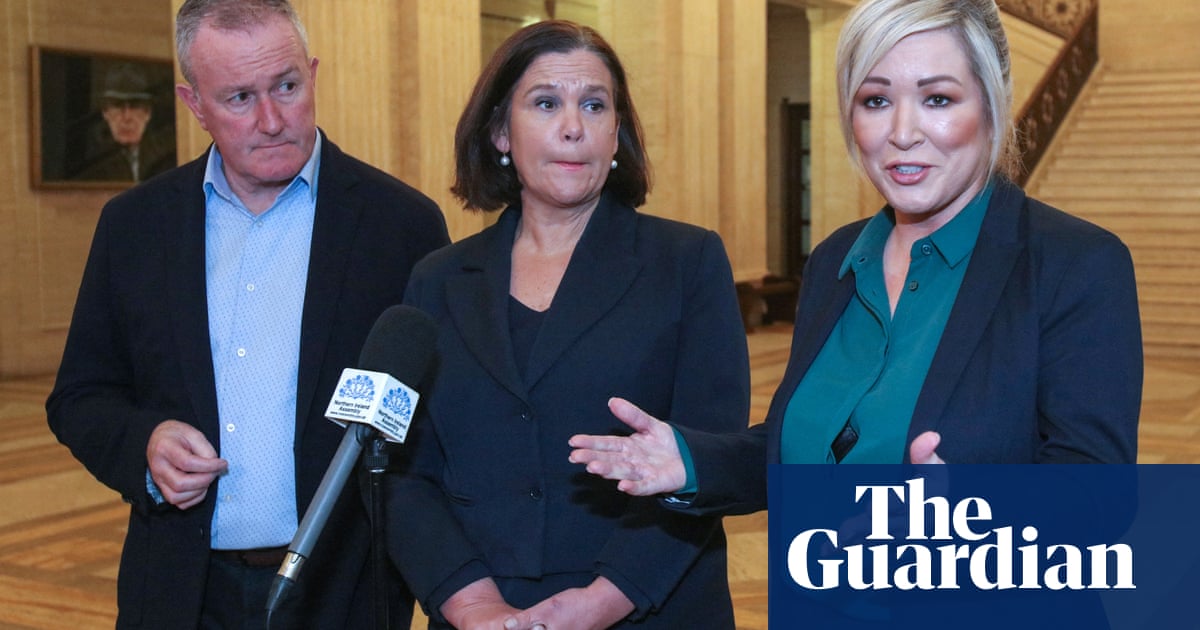
Ireland cannot trust an “erratic” and “dangerous” Boris Johnson on Brexit and needs to start pressuring Downing Street for a referendum on Irish unification, according to Mary Lou McDonald, the leader of Sinn Féin.
Johnson has forfeited credibility by unpicking the withdrawal agreement and cannot be believed when he says he wants a trade deal, said McDonald. “He’s the prime minister and perfidious Albion just got perfidiouser, if there’s such a word.”
If Britain did not “honour a bargain fairly struck” it would face a backlash from Ireland’s allies in the EU and US, where congressional leaders could sink Downing Street’s hopes of a US trade deal, said McDonald. “If there is damage in Ireland, if there’s a hardening of the border – well, then all bets are off.”
The Sinn Féin leader spoke to the Guardian after an opinion poll showed her opposition party to be the most popular in Ireland, with support at 32%. Recent blunders by the Fianna Fáil-led coalition government have put a question mark over its longevity and bolstered McDonald’s image as a taoiseach-in-waiting.
A government led by Sinn Féin would jolt British–Irish relations. A mouthpiece for the IRA during the Troubles, it has become a mainstream, leftwing party that appeals to voters in the south of Ireland on bread-and-butter issues, especially health and housing.
However, McDonald, 51, stressed its enduring determination to unite Ireland. “In my lifetime? Absolutely. All of the signposts, all of the markers, point in the direction of reunification,” she said.
By next year, the centenary of Northern Ireland’s creation, Catholics are expected to outnumber Protestants for the first time, a seismic demographic shift that comes just as Brexit has prompted some unionists to question the region’s position in the UK.
“The electoral majority for unionism is now gone, politics on this island has changed in ways that are profound,” said McDonald, a Trinity College graduate from Dublin who succeeded Gerry Adams as party leader in 2018.
However, Northern Ireland voters are not flocking to the republican banner. In the December general election Sinn Féin’s overall vote in the north fell by 6.7 percentage points. The fastest-growing bloc is the so-called non-aligned – voters who shun traditional orange/green labels. Opinion polls suggest they tilt towards the status quo: staying in the UK.
Anthony McIntyre, a former Belfast IRA member and commentator, said: “No provisional IRA volunteer who fought the provo war will see a united Ireland.” The NHS and other benefits of the UK would swing the result, he predicted. “People who are only nominally nationalist will vote for the union. That’s where the veto lies.”
McDonald said the promise of a new, progressive, inclusive Ireland, with an NHS-style health service, would win over enough voters.
Under the Good Friday agreement, the UK’s Northern Ireland secretary must call a referendum when it appears likely that most people would vote in favour of a united Ireland.
However, McDonald said ministers refused to spell out the exact conditions that would trigger a vote. “I wouldn’t like anybody in the British system to imagine that they hold a trump card that says ‘we will forever avoid or defer a referendum in Ireland’. They don’t have that right.”
She said a united Ireland must offer unionists “the kinds of protections and assurances that they need” – for instance, a possible continued role for the Stormont assembly. She ruled out moving the capital from Dublin.
Asked whether the IRA violence during the Troubles was justified, McDonald said: “I think it was inevitable.” Partition and discrimination created a “toxic” context that “framed” attitudes and choices, she said.
Pressed again on whether violence was justified, she said she was a child for much of the campaign. “I am certainly not going to be the person accountable for things that happened in 1973. I think that’s an extraordinary thing to ask of me.”
She said there would never be an agreed narrative on the Troubles. “I think it’s foolish to pursue it … you’re not going to bridge that difference.” History could not be undone, she said. “The past is the past. I can’t rewrite it.”
She rejected allegations that the IRA army council still existed and influenced party policy. “The IRA is gone, the conflict is over,” she said.
There was a hint of misogyny in the claims that shadowy men directed her, said McDonald. “It seems there are some people who find it hard to grasp that a woman from Dublin could be the leader of Sinn Féin, but I am.”
A severe Covid-19 infection in April – McDonald was floored and got pleurisy before recovering – led to a little bright spot in British–Irish relations. “Prince Charles sent me a letter,” she said, “which I thought was really nice.”












